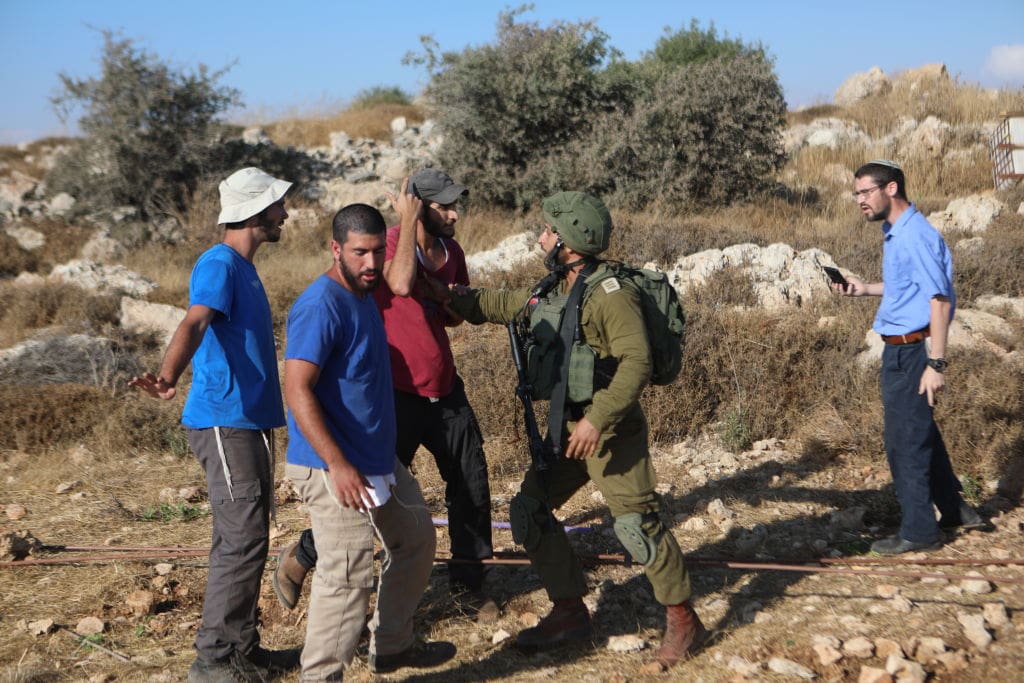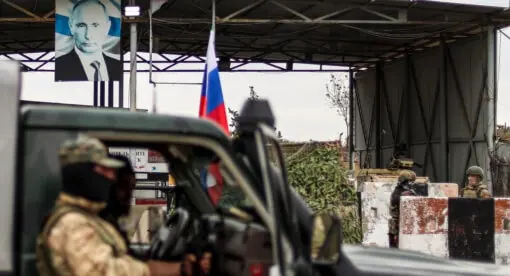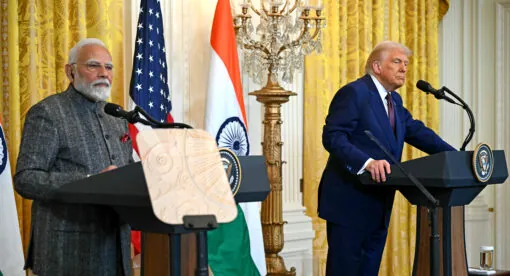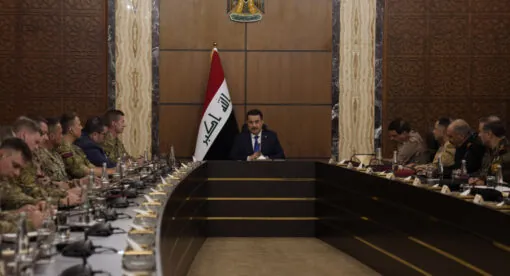Israel’s governing coalition, led by Prime Minister Benjamin Netanyahu, is moving aggressively to establish political and security structures in the West Bank that will foreclose the possibility of a two-state solution to the Israeli-Palestinian conflict. Far-right Cabinet members in powerful positions are pushing for closer collaboration between formal state security forces and nonstate settler militias in the West Bank. These actions delegate unprecedented power over key aspects of Israel’s military order in the West Bank to religious nationalists aligned with the Israeli settler movement and to extremist religious nationalist militants within Israel. In the near-term, if the Israeli coalition continues down this path, it will entrench a one-state reality designed to indefinitely suppress Palestinian social, political, economic, and security participation in that state.
The role of Israeli security units in that end state – especially if those units receive funding, training, or other support through U.S. security assistance to Israel – could soon present a complex but pressing challenge to U.S. policymakers. Already, Israeli settler militias are referred to as the “murky arm of the state” in the West Bank. Those militias are linked to human rights violations and large-scale attacks perpetrated against Palestinian residents of the West Bank, including recent violations against Palestinian-Americans, that have raised the concern of the U.S. government. The Israeli settler militias’ increasingly close cooperation with (and in some cases direct support from) the Israeli government complicates U.S. security assistance to one of its closest allies in the Middle East. Policymakers in Washington should closely monitor the developing relationships between Israel’s formal military structures and these newer state-aligned militias. The U.S. also should work to proactively communicate to the Israeli government the risks of deepening ties with organizations – state-run or otherwise – explicitly committed to crushing the possibility of a two-state solution to the Israeli-Palestinian conflict through armed violence.
New Rules of the Game?
The governing coalition can be characterized generally as an amalgamation of several right-wing coalitions, the most powerful being Netanyahu’s Likud coalition. Two increasingly powerful parties are part of the ruling coalition: Religious Zionism, led by the current Finance Minister Bezalel Smotrich, and Otzmat Yehudit (Jewish Power), led by the current National Security Minister Itamar Ben-Gvir. Both Religious Zionism and the Jewish Power parties are expressly committed to the annexation of the Israeli-occupied West Bank and the imposition of a Jewish-led order over all the Israeli-controlled territory between the Mediterranean Sea and the Jordan River. Further, the preferred policy position of the Religious Zionism and Jewish Power parties is also widely shared by other actors in Israel’s governing coalition, including within Likud. Netanyahu himself echoed these sentiments in late June, saying that Israel “needs to crush” Palestinian ambitions for an independent state. However, the governing coalition and security forces have not settled two main issues. The first is the extent to which the Israel Defense Forces (IDF) in the West Bank should be placed under a civilian command closely associated with the Jewish settlement movement; the second is what role nontraditional, state-backed security forces and nonstate actor Jewish settler militias should have in the Israeli security architecture in that region.
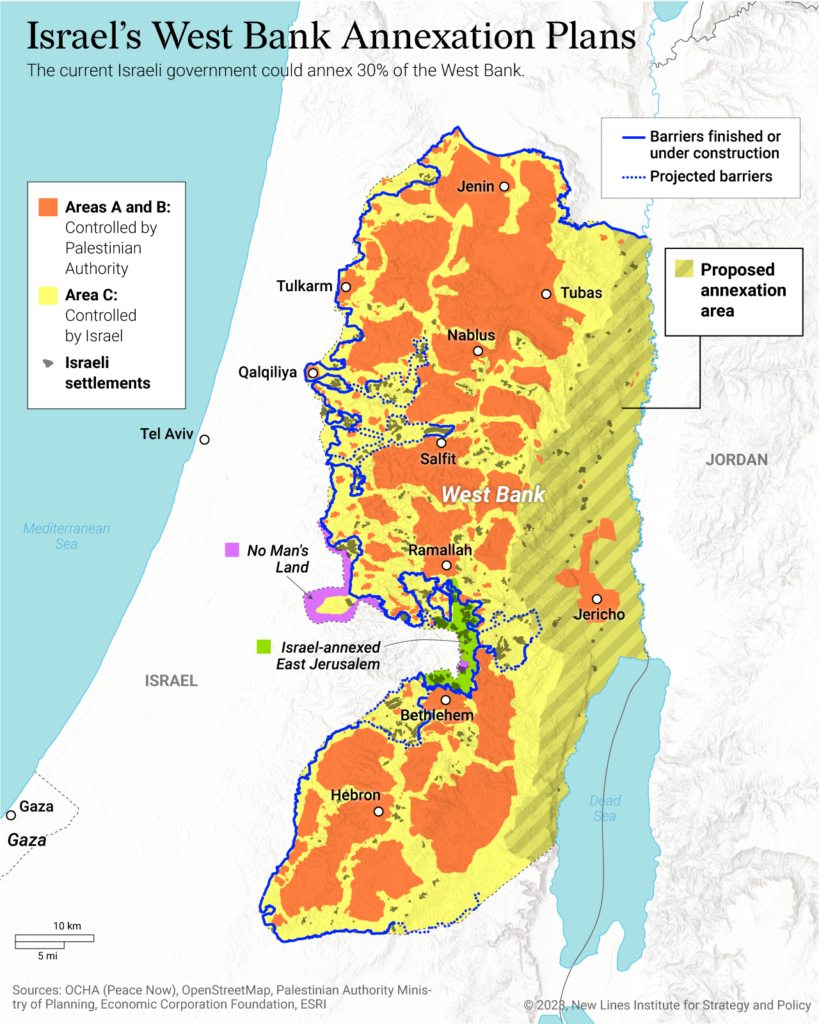
On April 2, Israel’s Cabinet voted to move forward with plans to found a new National Guard under the authority of Ben-Gvir. The plan would put roughly 2,000 police officers at least nominally under Ben-Gvir’s control (his exact powers are currently under debate) and task them with emergency response to domestic unrest within Israel. In November, Ben-Gvir agreed to bring his party into the coalition in exchange for being given the newly created position of National Security Minister, a revamped version of the Internal Security Minister with new authority over the Border Police in the West Bank. Despite Ben-Gvir’s repeated efforts to issue direct commands to police units, however, in practice the Border Police remain under the control of the Israeli Police, and Ben-Gvir’s relationship with the police commissioner is strained.
Like Ben-Gvir, Smotrich has moved methodically to consolidate the relevant state decision-making apparatuses under his rule to enact his vision. He has secured a minister position within the Defense Ministry and been appointed Coordinator of Government Activities in the Territories, a role that gives him direct jurisdiction over the settlements he wants to expand. He has moved quickly to capitalize on these authorities, urging government agencies to prepare for an additional 500,000 settlers in the West Bank, which would bring the current estimated population of 700,000 settlers up to more than 1 million within the next decade. One anonymous member of Israel’s Civil Administration in the West Bank acknowledged that, “There is no doubt that what Smotrich is aiming at is a process of annexation.”
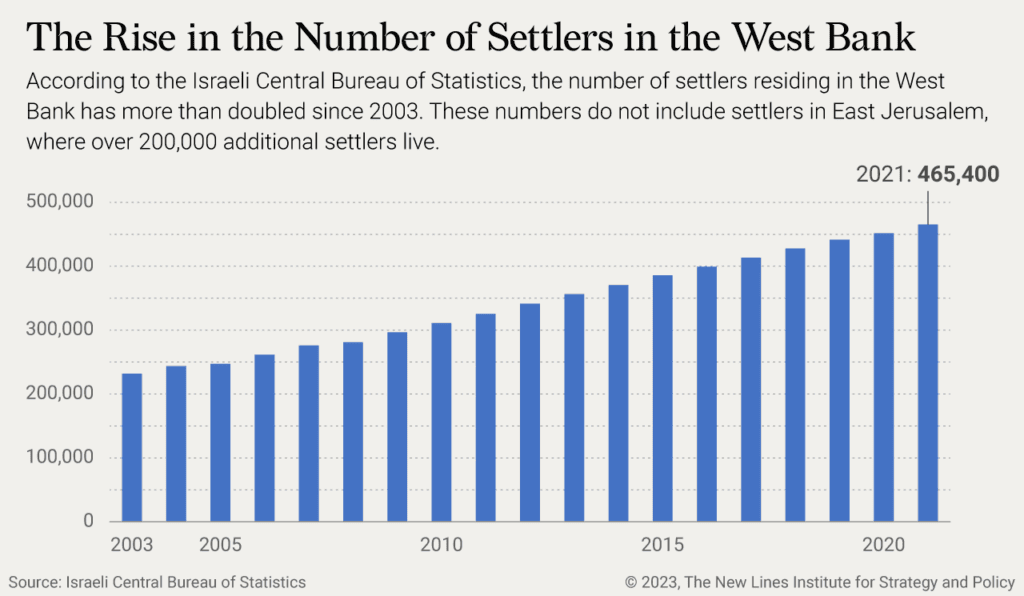
Rising Radicalism Among Israeli Security Forces in the West Bank?
Israel’s governing coalition is wrestling with the evolution of an extremist religious nationalist movement that has metastasized from what was once characterized as Israel’s far-right political fringe. The strategic goal of this movement is to reshape the Israeli state to assert Jewish primacy over all of Israel and the Israeli-occupied Palestinian territories, including a hardline stance to limit or even eliminate the civil rights of Palestinians (whether or not they have Israeli citizenship). Although Palestinians lacking Israeli citizenship are especially vulnerable to this trend, Smotrich has toyed with stripping Palestinian citizens of Israel of their citizenship, a long-held goal of Israel’s far-right fringes.
This sociopolitical movement is not monolithic, but it fuses two main ideological currents, creating a potent alliance within Israel’s sociopolitics and, increasingly, within the state’s security strategy. One current comes from the Religious Zionist settler movement that developed after Israel won the 1967 Six-Day War and occupied the West Bank, Gaza, the Golan Heights, and the Sinai. The second current comes from the now deceased Rabbi Meir Kahane, a U.S.-born religious leader and writer. Rabbi Kahane founded a political party, Kach, a sectarian militia that the U.S. listed as a terrorist organization until recently. He also founded the Jewish Defense League and became a controversial Israeli politician, remaining a potent figure even in death.
The Heirs of Kahane on the Rise
The ideological current led by Kahane until his assassination in 1990 garners the most attention because it is the most obviously associated with the potential to incite human rights violations. Kahane, who was banned from the Knesset (Israel’s parliament) in 1988 after one term for his racism, focused on the expulsion of all Arabs from Israel and the West Bank. He often fantasized about being appointed defense minister so he could order the IDF to “do whatever you need to do,” and tell Palestinians that “Whoever does not leave will be slaughtered.” After Kahane died, his movement remained a radical fringe largely rejected by mainstream Israeli politicians. The movement went on to be banned under Israel’s anti-terrorism laws in 1994, after avowed Kach supporter and U.S.-born Israeli settler Baruch Goldstein killed 29 Palestinians at the Cave of the Patriarchs in the West Bank city of Hebron.
Kahanism is a militant communalist ideology that seeks to impose sectarian dominance through the powers of the secular state structures. Religious Zionism is a messianic ideology that seeks to fulfill a religious mission through the settlement of the Jewish population without limits throughout Israel and the West Bank. In the past, these were distinct ideologies, but they are now blending in Israel and the West Bank, allowing a larger, more popular, and more militant messianic movement to take root.
Since Kahane’s assassination, his protégés have pursued a two-pronged approach to asserting their national vision. The first is a gradual reinvention of the Kach movement through more careful messaging, although with little shift in the end goal of asserting Jewish supremacy across all of Israel and the West Bank. Jewish Power, Kach’s ideological successor party led by Ben-Gvir, was founded in 2012. Ben-Gvir himself was a Kach member and youth coordinator before the group was outlawed in Israel. Ben-Gvir praised Kahane at a commemoration event in November 2022, after being reelected to the Knesset earlier that month, saying, “Ultimately Rabbi Kahane was about love. Love for Israel without compromise, without any other consideration.”
However, he has been careful to refrain from Kahane’s explicit endorsement of ethnic cleansing and mass violence against Palestinian civilians. In 2015, Ben-Gvir instructed his followers to chant “death to terrorists” instead of “death to Arabs,” telling them, “that’s legal with a stamp.”
In parallel with this effort to moderate, in word if not in deed, Israel’s far-right fringes have pursued a second tactic – acting outside the confines of the law, gambling that the Israeli state’s more moderate factions will lack the political wherewithal to rein them in. Israel’s growing “hilltop youth” movement represents the clearest example of this trend – loosely organized militias setting up illegal settlements across the West Bank and using them to conduct targeted harassment, beatings, and property damage against Palestinians. Meir Kahane’s grandson, Meir Ettinger, is a leader of the movement.
Senior leadership of the IDF generally views these militias as a nuisance and occasionally orders IDF soldiers to arrest members of these militias or clear encampments, although Prime Minister Netanyahu has repeatedly rebuffed these requests. And although senior IDF leadership largely disapproves of the movement, some factions within the force have openly trained and equipped the militias to conduct human rights abuses against Palestinians. There is also reportedly a rise in support for the Jewish Power party among the IDF’s rank and file, with an estimated 20% of IDF soldiers voting for Ben-Gvir’s party. One hilltop youth leader has even been tapped as a spokesperson for a Knesset member in Ben-Gvir’s party. Over time, their illegal settlements become facts on the ground that are politically impossible to remove. Israel’s new far-right government is now moving to legalize them.
This approach – creating facts on the ground with illegal activities while gradually consolidating control of key government institutions to enable more decisive action – is spelled out most clearly by Bezalel Smotrich. “Israel’s Decisive Plan,” Smotrich’s 2017 policy proposal, offers the clearest summary of how the Israeli far right intends to settle the “Palestinian question” by force.
Smotrich refers to the idea of a Palestinian state coexisting with an Israeli one as a “fantasy” that must be crushed “willingly or by force.” Crushing Palestinian national aspirations must be achieved “with deeds,” which for Smotrich entails a massive increase in West Bank settlements to “make it clear to all … that the Arab dream of a state in Judea and Samaria [the West Bank] is no longer viable.” Once those aspirations have been crushed, Palestinians will be given two choices: either to remain as second-class citizens in an explicitly Jewish state, or to accept coerced emigration to other Arab countries. “Loyal” Palestinians may be granted residency and citizenship rights, although Smotrich is careful to clarify that these rights are highly contingent on both good behavior and demographic trends. Emigration, he asserts, will likewise be “planned, willing, and based on a desire for a better life,” rather than “cruel expulsion.”

Smotrich is careful to avoid any discussion of a third option – what happens to Palestinians who refuse to accept their second-class status but are also unwilling or unable to emigrate? – but he does note that “loyalty is not an imperative as long as the law of the land is the binding authority,” suggesting that less “loyal” Palestinians will simply be forced to accept indefinite rule by a police state. Moreover, Smotrich has made supportive comments toward settlers who beat up Palestinians and destroy their property, referring to them as “brothers.” Although he rejects ethnic cleansing on paper, Smotrich and his cohort are working to make life unlivable for Palestinian civilians, turning coercion into a key tool of emigration to ensure Palestinians and Arab Israelis remain a demographic minority in Israel and Palestine.
Israeli Settlements and Sub-state Militias in the West Bank
Kahane’s direct ideological successors, although growing in influence, would not be as potent a force without their alliance with the Religious Zionist movement, including the more radical elements of that movement from the Jewish settlements in the West Bank. At present, these two strands – Kahanism and Religious Zionism – are most frequently observed in combination in the disparate settler groups, many of which are armed, in the West Bank. Further, the coalition agreement with Smotrich is providing an opportunity for the finance minister and his sociopolitical allies to enact the first stages in a plan that could blend religious nationalist settler militias into the Israeli security architecture in the West Bank.
Already, the activities of some IDF units – most notably the controversial ultra-Orthodox Jewish Netzah Yahuda Battalion – have drawn calls within the U.S. for the application of Leahy restrictions on the IDF. About 500 fighters make up the battalion, which is part of the IDF’s large Kfir Brigade and has a main area of operations in the West Bank. The battalion was designed to provide a mechanism for the IDF to recruit from the ultra-Orthodox Jewish community and give the recruits an environment where they could practice the tenets of their faith and serve the State of Israel. However, Netzah Yahuda has earned a reputation for being particularly dangerous. Multiple credible reports indicate that the unit is more violent than other IDF units in its interactions with Palestinians and their property in the West Bank. Moreover, some of the battalion’s members were linked to the death of Omar Assad, an elderly Palestinian-American, in 2022.
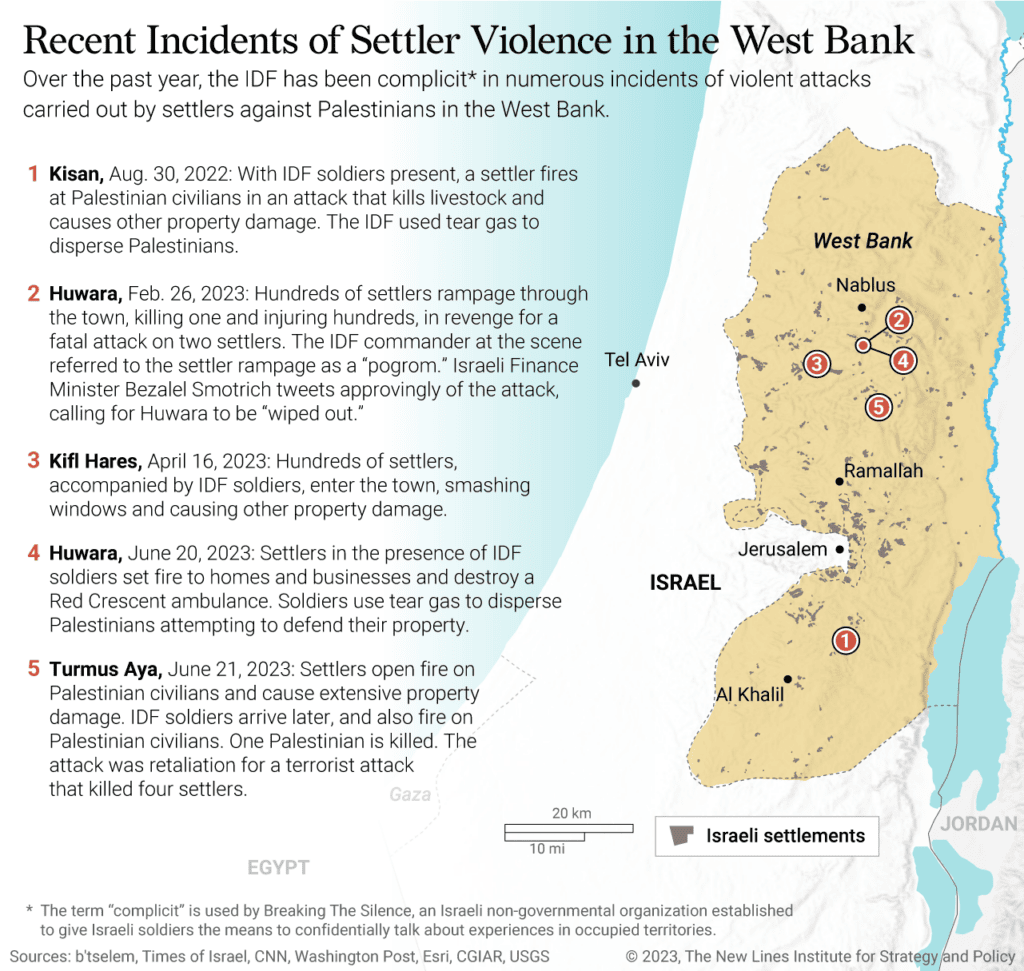
A potential near-term challenge for U.S. policy on security assistance to Israel that could result from Smotrich’s broader plan for the West Bank would be the proliferation of Netzah Yahuda-type units throughout the Israeli force posture in the West Bank. This development could result from state-backed intertwining of settler militias in the same battlespaces as regular IDF and Border Guard units, or the wholesale replacement of regular IDF units and Border Guard units with settler militias backed by IDF logistics. Although tensions are rising between the IDF and settler militias over how to respond to violence perpetrated against the Israeli settlements by fighters from Palestinian armed groups, these tensions are meant to be resolved over time by Smotrich’s plan through blending Israeli forces and loosening rules of engagement against the Palestinians. Therein lies U.S. policymakers’ dilemma: how to assess the amount of U.S. security assistance to Israel that is used on units that commit human rights violations against Palestinians and that maintain a status quo in the West Bank that makes a two-state solution impossible.
State Sanction of Israeli Extremist Militias Will Be a Dilemma for the United States
Looking into the future, if these dynamics continue, U.S. security assistance to Israel will be significantly complicated and may be subject to limitations imposed by two key legal frameworks. These are:
- The Leahy Law, which prohibits any form of security assistance to a unit if the Secretary of State has credible information that the specific unit (not the state or armed force as a whole) has committed gross violations of human rights. When specific units cannot be identified before the equipment transfer, such as the transfer of small arms that could plausibly change hands many times, the Secretary of State maintains and shares a list of prohibited units with the partner country. Additionally, assistance “shall only be made available subject to a written agreement that the recipient government will comply with such prohibition.” The United States and Israel currently maintain a list of this nature.
- End Use Monitoring (EUM) laws, which prohibit the transfer of defense articles (i.e., materiel) sold, leased, or exported by the United States to third parties, and prohibit from using those articles for purposes “other than those for which they were furnished without first receiving written U.S. government authorization.”
Taken together, these laws prohibit not only the direct transfer of military equipment to security forces in the event of human rights abuses, but also any form of indirect (even unintentional) transfer of equipment to the force. Current plans for the National Guard, for example, would leave it closely intertwined with the existing security apparatus. Much of the force would be on reserve from other branches, and even encouraged to keep security equipment at home for rapid National Guard mobilization. Thus, a sanction against the National Guard itself would quickly pose a much larger challenge to U.S.-Israeli security cooperation. Importantly, these laws are not merely authorizing officials to impose these sanctions, but legally obligating them to do so if partner forces take certain actions.
According to Congressional researchers, Israel has received over $158 billion in bilateral assistance and missile defense funding, which makes Israel the largest cumulative recipient of U.S. assistance since World War II. The provision of American security assistance to Israel has generally, but not completely, been an area of bipartisan agreement since the mid-20th century. However, a growing number of Americans are beginning to question U.S. support for Israel, and U.S. and Israeli policy visions for a sustainable solution to the Israeli-Palestinian conflict are diverging more and more. In this atmosphere, the circumstances the Israeli government has imposed in the West Bank, and the U.S. role in facilitating the situation, will be increasingly open to vigorous debate inside the United States.
The normal U.S. approach to monitoring and assessing security assistance to Israel – strategic ambiguity – will be tested harshly by the policy on the West Bank that Smotrich, Ben-Gvir, and their partners are implementing. Future U.S. efforts to have oversight over security assistance to Israel will be complicated by the policies of Israel’s government and will deteriorate because of the inclusion of extremist Jewish settler militias and their partners in the state-imposed security order in the West Bank. The primary goal of U.S. policy, to create conditions for a two-state reality for Israelis and Palestinians, is severely threatened. U.S. policymakers will also likely soon have to grapple with how to continue to support Israel in honor of the close relationship between the two countries, while also ensuring that U.S. security assistance does not empower Israeli forces that violate the human and civil rights of Palestinians.
Calvin Wilder is an Analyst at New Lines, focusing on non-state actors in the Middle East and Central Asia. Prior to joining the institute, Calvin was a Research Assistant at the Washington Institute for Near East Policy’s Program on Arab Politics, where his research focused on economic and humanitarian issues in territories held by non-state actors in Syria. He previously worked as a Research Assistant on the Chicago Project for Security and Threats’ Arabic Propaganda Analysis Team, translating and analyzing Arabic-language propaganda produced by ISIS, al Qaeda, and other extremist groups. He was a Boren Scholar in Amman, Jordan, from 2019-2020, working as a research and translation intern at Syria Direct, where he assisted with the outlet’s award-winning coverage of humanitarian and human rights issues in Syria. He tweets at @CalvinWilder.
Nicholas A. Heras is the Senior Director for the Strategy and Innovation Department and a coordinator for academic initiatives across New Lines. He was previously the Deputy Director of the Human Security Unit and the Senior Analyst and Program Head for the State Resilience and Fragility Program at the Institute. Prior to the Institute, he was the Director of Government Relations and the Middle East Security Program Manager at the Institute for the Study of War (ISW). Nicholas was also the Middle East Security Fellow and the 1LT Andrew J. Bacevich, Jr., USA Fellow at the Center for a New American Security and a Senior Analyst at the Jamestown Foundation. Nicholas served as a Research Associate at the National Defense University from 2013-2014. He was a David L. Boren Fellow based in Beirut, Lebanon from 2010-2011, and previously worked as the Research Associate at the American University Center for Global Peace. He tweets at @NicholasAHeras.
The views expressed in this article are those of the author and not an official policy or position of the New Lines Institute.

